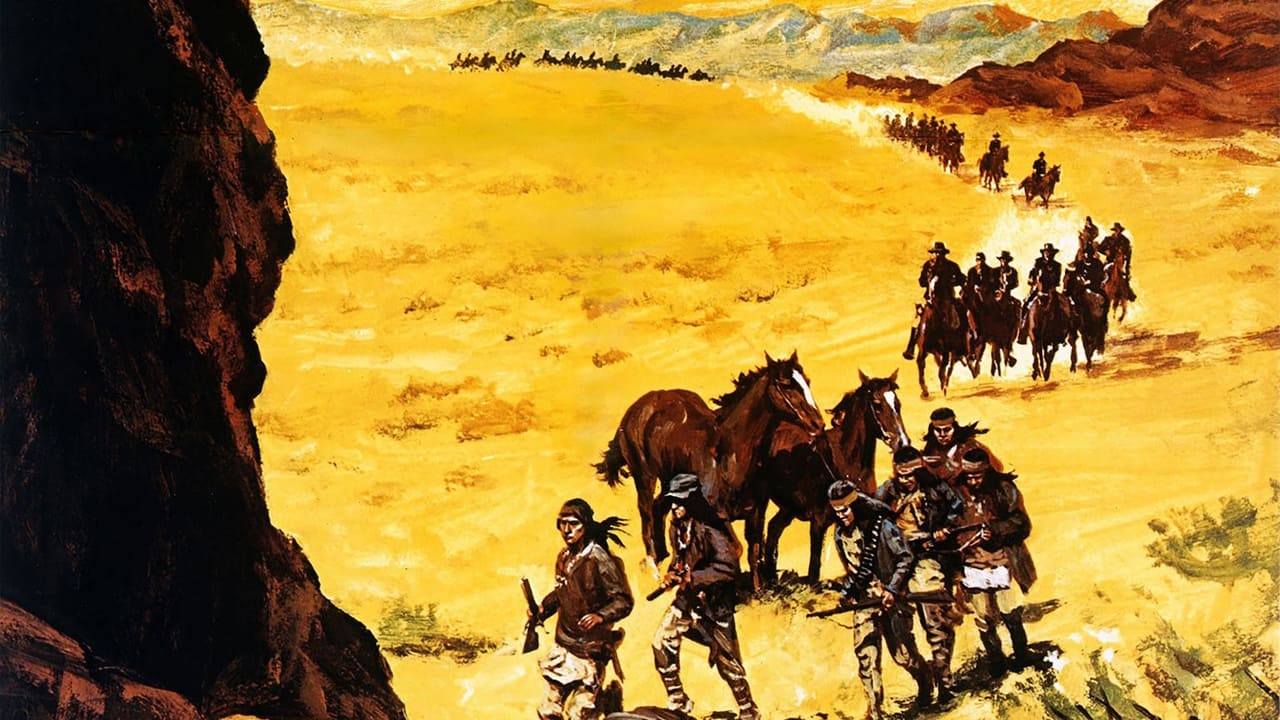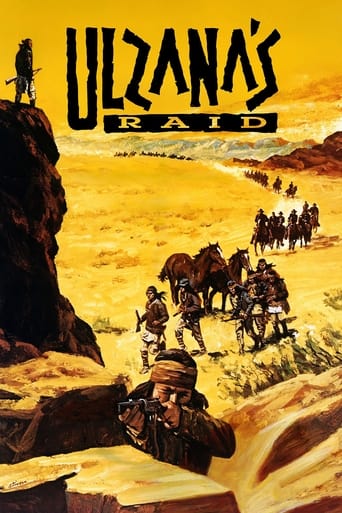Hellen
I like the storyline of this show,it attract me so much
MoPoshy
Absolutely brilliant
filippaberry84
I think this is a new genre that they're all sort of working their way through it and haven't got all the kinks worked out yet but it's a genre that works for me.
Sarita Rafferty
There are moments that feel comical, some horrific, and some downright inspiring but the tonal shifts hardly matter as the end results come to a film that's perfect for this time.
scr555
Burt Lancaster did a trio of excellent westerns in the late 70s, including Lawman and Valdez is Coming. Of the three, Ulzana's Raid is the best; it ranks as one of the best and most realistic westerns ever made. It's not for the faint of heart, director Aldrich and screenwriter Alan Sharp make no bones about how brutal and terrifying the Indian wars of the Southwest were on both sides. Lancaster is superb as McIntosh the hard-bitten Indian scout, and is ably supported by old pro Richard Jaeckel and Bruce Davison as callow, inexperienced Lt. DeBuin. If you like westerns and you're a history buff, you'll enjoy this movie immensely. It's very well made and true to history.
virek213
Pretty much up until the extreme political and social upheavals of the 1960s, whenever Hollywood wanted to deal with Native American issues, it did so with extreme prejudice, particularly in any Western in which the U.S. Cavalry, usually led by the ultimate patriot John Wayne, saw it as their mission to rid the plains, deserts, and mountains of the virgin West of what it saw as "savages" in the name of Manifest Destiny, and the name of God.But the actual history is quite a bit different from the way we had gotten around to looking at it. One such film that did a lot to right, as opposed to merely "rewrite", that history was ULZANA'S RAID.This 1972 Western film from legendary director Robert Aldrich (THE DIRTY DOZEN; FLIGHT OF THE PHOENIX) is set in the 1880s in the territory of Arizona and New Mexico. A vengeful Apache named Ulzana (Joaquin Martinez) has jumped the designated San Carlos Indian Reservation, having become understandably inflamed by the mistreatment of his people by the U.S. Army, and is now on his own violent spree along the border. Assigned to track and hunt him down is one Lt. Garnett DeBuin, a fairly inexperienced officer only six months removed from West Point well played with the right amount of naivete and curiosity by Bruce Davidson, and with a detachment aided by the Apache scout Ke-Ni-Tay (Jorge Luke) and an extremely experienced White scout named MacIntosh, more than ably portrayed by Burt Lancaster. But in their long struggle to track down and apprehend Martinez and his band of rampaging Apache, a lot of atrocities are committed. Davidson is at a loss to describe how he feels about what the Apache are doing to the new inhabitants of the land, including the hideous scene of a farm family (led by Karl Swenson) who are victims of the rampage, even though this land was Apache territory first and foremost. And when Davidson asks Lancaster's scout why he doesn't hate the Apache so much as tries to empathize with them, Lancaster's reply is so direct and to the point: "It would be like hating the desert just because there ain't any water in it." Like quite a few Westerns from the mid-1960s on, ULZANA'S RAID is a very complex film on the nature not of, say, White Men and Red Men so much as that of Man, period—the good; the bad; and, too often, the ugly as well. Given the time it was made, it was very easy to read this as an allegory for the Vietnam War, although Aldrich and screenwriter Alan Sharp (NIGHT MOVES; THE HIRED HAND) don't make it so in a flashing neon sign sort of way. If there's any film that ULZANA'S RAID resembles, it would probably be director Sam Peckinpah's 1965 Civil War-era Western MAJOR DUNDEE, which also dealt with a punitive hunt of a rampaging Apache by a rag-tag regiment of U.S. cavalry soldiers, though in that case the titular character played by Charlton Heston was obsessed with his own glory, whereas here Davidson's flaw is merely being naïve. In both cases, however, people do get killed in prodigious numbers, sometimes quite needlessly.Aldrich doesn't shy away from the atrocities on either side; even by the standards of 21st century filmmaking, there is a fair amount of violence and bloodshed, some of it hard to stomach. It is, however, a violence of a qualitative nature far removed from, say, Quentin Tarantino and closer to (though without the slow-mot or montage editing) that of Peckinpah, who had always been a fan of Aldrich's work. Davidson, who made a memorable debut in the 1972 horror film WILLARD, does a very good job in his role as DeBuin; and Lancaster, unsurprisingly, gives a solid performance as MacIntosh. Richard Jaeckel, who had been in THE DIRTY DOZEN, manages a good turn as well as a cynical sergeant; and Martinez conveys a scary power to his role as Ulzana.Shot largely on locations in Nevada and southern Arizona, and with veteran cinematographer Joseph Biroc's superb depiction of the parched landscape, ULZANA'S RAID remains one of the most unsettling and subversive Westerns ever made of any era, particularly its own; and while the violence is likely to unnerve and perhaps still repel a few people, the very nature of the story makes it a hugely insightful film even to this day.
mark-rojinsky
Ulzana's Raid was released in that most downbeat of hippie years - 1972 and is a western that captures the zeitgeist of the early-'70s so well. Bleak and lacking metaphysical colour but directed with flair by Aldrich the narrative involves a breakout from a wretched reservation by a group of Apache braves. A US cavalry brigade led by but wet-behind-the-ears Lieutenant Garnett DeBuinn (young blond Bruce Davison) and scouts MacIntosh (Burt Lancaster) and Ki-Ne-Tay (Mexican actor Jorge Luke) set out to track the Apaches and encounter the spectacular but bleak Arizona-Mexican landscape. The Apaches are not depicted as noble savages and parallels with Vietnam are clear to see. London's Time Out Film Guide refer to this western as being: 'extraordinarily intelligent'. Some of the props are very interesting: for example the late 19th-Century framed military pictures in Major Cartwright's headquarters and a sort of mahogany welsh-dresser/pigeon-hole in the background which suggests a kind of synthesis. What about the tome and blue and white Dutch ceramic saucer in Willy Rukeyser's hut?
Wuchak
"Ulzana's Raid" went unnoticed when it was released in 1972 and I can understand why to a degree because it's not a rollicking, cartoony Western. It's a grim, adult-oriented Western that's realistic and thought-provoking, not to mention utterly brutal. I've come to appreciate it more as I get older.THE PLOT: A greenhorn Lieutenant, DeBuin (Bruce Davison), is assigned to a fort in Arizona and is put in charge of a company to stop the eponymous Apache chief (Joaquín Martínez) and his band who've jumped the reservation. A veteran sergeant (Richard Jaeckel), a weathered scout named McIntosh (Burt Lancaster) and his Apache partner, Ke-Ni-Tay (Jorge Luke), assist the Lieutenant, whose civilized sensibilities are shocked by the brutality of the fugitive Apaches.Davison is great as the naïve Lieutenant – just 6 months out of the academy -- who somewhat awkwardly takes command of the group of seasoned frontiersmen. This happens all the time in war situations. Thankfully, DeBuin is humble and smart enough to yield to the wisdom of McIntosh and the sergeant, most of the time.Speaking of DeBuin, most viewers view Ulzana's bloodbath through his eyes and we can relate to his confusion and frustration over the gross inhumanity he witnesses for the first time. Yet this isn't a film that takes one side or the other; it just shows the way it was. DeBuin sits down with Ke-Ni-Tay to understand why the Apaches would enact such carnage. The warrior explains the Native belief of acquiring an enemy's power through torturous death, but no matter how you slice it it's a bunch of darkened/ignorant Barbra Streisand (BS). It doesn't matter what the person's reasoning is, anyone who commits the atrocities of Ulzana and his raiders deserve to be executed on sight. After all, Timothy McVeigh "had his reasons" for what he did; and so did the Muslim terrorists on 9/11.Like I said, though, the movie refuses to be lopsided and there's a scene where DeBuin plainly sees that the "good" soldiers could just as easily fall into such supposedly justified depravity. The point? Each one of us could commit wicked acts if we open certain "doors" within, allow ourselves to be influenced by radical belief systems or hang around the wrong people, etc. Race and tribe are irrelevant. Just yesterday, I found out that a supremely goodhearted friend I hadn't seen for a decade held-up the workers at a Flying J at gunpoint and walked-off with over $3000, but it was a case of drug-addled insanity because, as soon as he came to his senses, he brought all the money back. He's still in a heap of trouble though. A couple of months ago another friend who was in my wedding party brutally stabbed someone to death and is now facing life in prison or worse.Being a Christian, DuBuin has to struggle with his hatred toward Ulzana and his raiders. At a campfire Jesus Christ and his teachings come up and the sergeant (Jaeckel) tells the Lieutenant that he ain't turning no cheek with Ulzana and his band. This effectively shows the gross misunderstanding that revolves around Christ' teaching to "turn the cheek." Jesus was referring to a backhanded slap to the face, which was an insult in that culture. In other words, we could all save ourselves a lot of trouble in life if we learn to ignore the antagonism of various morons who would like to divert our focus and ruin our day. The Old Testament teaches this as well: "A fool shows his annoyance at once, but a prudent man overlooks an insult" (Proverbs 12:16). So Jesus was talking about giving an antagonist a break for the sake of peace in situations of personal offense; he wasn't referring to cases of criminal atrocities, which is what Ulzana and his band were guilty of committing. The bible says that governments are "God's servants" for good in the sense that they protect citizens from criminals; they "bear the sword," meaning that they possess the power to punish and even execute criminals when justified (see Romans 13:1-6). Relating this to the movie, DeBuin and his company, including the sergeant, ARE the government and they "bear the sword." As such, they are perfectly justified in annihilating Ulzana and his raiders from the face of the earth.Ke-Ni-Tay (pronounced KIN-eh-TAY) is an excellent character, by the way. Take note. So is McIntosh. In fact, the four protagonists are all believable, well-developed characters. Another plus is that they used actual Native Americans for the Apache roles, albeit largely Latin American.On the downside, there are scenes of horse-tripping and the story could've been more compelling, but I sense that the filmmakers were shooting for realism more than entertainment."Ulzana's Raid" is generally an overlooked Western, but it shouldn't be. It's very much worth your time and in some ways great. In my opinion it's better than the overrated "The Wild bunch," a contemporaneous Western.The film was shot in Arizona and Nevada. The USA DVD runs 104 minutes, but there are like 6 different cuts of the film.GRADE: B+ or A-

